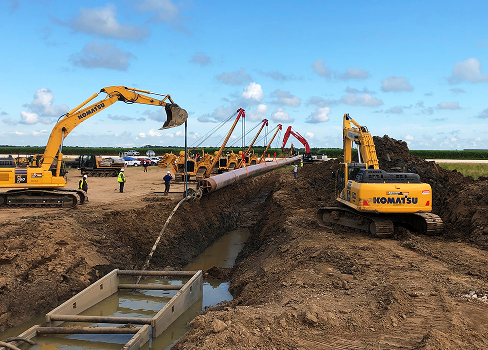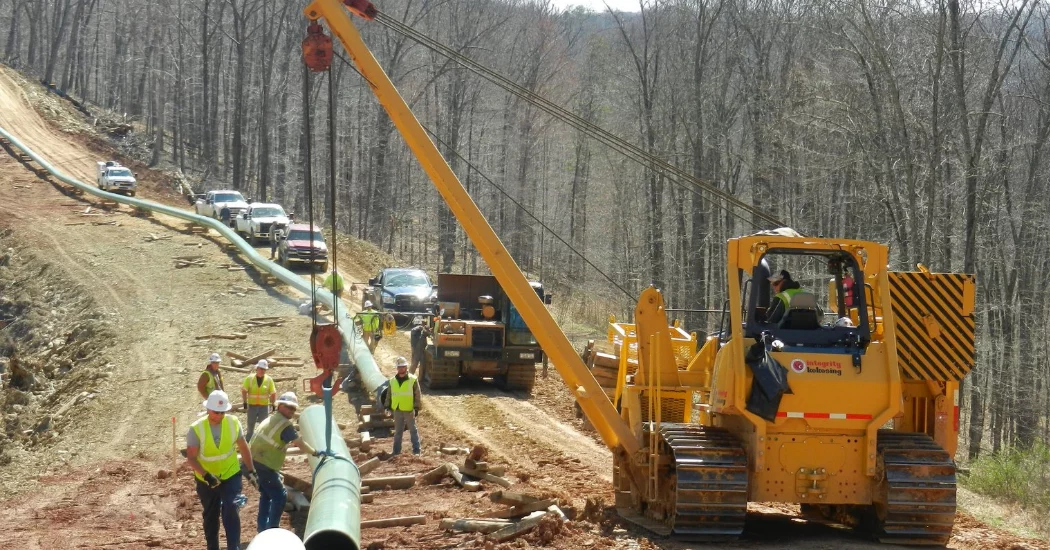Pipeline Construction Services: What Types of Pipelines Can They Handle?
The Necessary Guide to Understanding Pipeline Construction Providers and Their Importance
Pipeline Construction solutions are fundamental to the transport of important resources such as water, gas, and oil. These solutions involve thorough preparation and execution, sticking to rigorous safety and environmental criteria. As the industry adapts to modern-day difficulties, understanding its ramifications and components comes to be progressively important. What aspects add to the expanding importance of these services in today's economic climate? The complying with sections will explore these important elements.
Review of Pipeline Construction Solutions
Pipeline Construction solutions include a variety of activities essential for the installation and upkeep of pipes made use of to deliver various substances, consisting of water, gas, and oil. These solutions are important for ensuring the safe and reliable activity of sources from one area to an additional. The procedure typically begins with extensive preparation and style, which takes into consideration regulative needs, environmental considerations, and logistical difficulties.
Excavation and grading of the land are performed to prepare the website for Pipeline setup as soon as preparation is full. This is complied with by the actual laying of the pipelines, which involves welding or signing up with sections with each other to develop a continual flow path. After setup, extensive testing is done to guarantee honesty and security. Maintenance services are also provided to resolve any type of issues that may arise in time. In general, Pipeline Construction services play an essential function in supporting framework for power and water circulation.
Secret Parts of Pipeline Construction
An effective Pipeline Construction job relies upon a number of vital elements that assure the safe and effective installment of the Pipeline system. First, extensive website analyses are critical, as they determine the environmental and geographical aspects that might affect Construction. Next, the option of proper products, such as pipelines and installations, is important for securing toughness and compatibility with the delivered compounds.
Progressed Construction methods, consisting of trenchless modern technology and directional boring, enhance effectiveness and decrease environmental influence. Efficient job administration is an additional important part, working with labor, devices, and timelines to meet project goals.
In addition, interaction amongst stakeholders, consisting of engineers, specialists, and local authorities, warranties placement on task requirements and demands. Complete quality control measures throughout the Construction procedure make sure compliance with market standards and maximize the Pipeline's functional life expectancy. Collectively, these elements create the backbone of a successful Pipeline Construction task.
Safety Requirements and Rules in Pipeline Construction

Governing bodies, such as the Occupational Security and Health And Wellness Administration (OSHA) and the Pipeline and Hazardous Materials Safety Administration (PHMSA), stated certain demands that control Construction techniques. These consist of procedures for tools usage, worker training, and emergency situation reaction procedures. By executing these standards, Construction business not only secure their staff members but additionally safe and secure public trust fund. Ultimately, extensive safety and security measures add to the lasting success of Pipeline jobs, ensuring they fulfill both functional and environmental expectations.
Ecological Factors To Consider in Pipeline Projects

Environmental factors to consider are important to the planning and implementation of Pipeline projects. These jobs need to examine prospective effect on communities, water resources, and local wildlife. Carrying out complete ecological impact assessments (EIAs) is essential, allowing stakeholders to determine and mitigate dangers before Construction starts.
Shielding sensitive areas, such as habitats and marshes, often calls for implementing particular design features or alternative routing to decrease interruption. In addition, Pipeline drivers are charged with developing approaches for avoiding spills and leakages, which can have disastrous impacts on the setting.
Involvement with local neighborhoods is essential, as public issues can cause task adjustments that improve environmental management. Compliance with policies established by ecological firms guarantees that jobs satisfy sustainability requirements, fostering look at more info an equilibrium between infrastructure demands and eco-friendly conservation. Inevitably, attending to environmental considerations not only safeguards nature yet additionally advertises community depend on and task viability.
The Duty of Modern Technology in Pipeline Construction
Technology plays an essential duty in modern-day Pipeline Construction, improving efficiency and precision. Advanced surveying methods permit exact preparation and execution, decreasing environmental effect and task delays. In addition, the combination of automation and robotics enhances operations, reducing labor costs and enhancing safety on Construction sites.
Advanced Surveying Methods
Advanced evaluating techniques play an important role in the effective execution of Pipeline Construction projects. These methods leverage advanced technology to assure precise mapping and evaluation of the terrain where pipes will be set up. Methods such as Geographic Info Systems (GIS), LiDAR (Light Discovery and Ranging), and 3D modeling allow engineers to envision and assess the landscape, identifying ecological concerns and prospective barriers. By making use of these sophisticated devices, groups Discover More can enhance accuracy ready and alignment, significantly decreasing the threat of errors during Construction. In addition, real-time information collection enables for prompt changes and informed decision-making throughout the task lifecycle. Inevitably, these evaluating innovations add to improved effectiveness, safety and security, and sustainability in Pipeline Construction initiatives.
Automation and Robotics

Economic Impact of Pipeline Infrastructure
Pipeline infrastructure plays a necessary duty in forming regional economic situations and promoting trade. By giving a reputable means of carrying oil, gas, and other assets, pipelines lower transport prices and boost supply chain effectiveness. This infrastructure attracts financial investment, boosts work creation, and promotes economic growth in bordering locations.
Furthermore, the Construction and maintenance of pipelines add significantly to neighborhood economic situations, creating various work chances in numerous sectors, from engineering to labor. The increase of tasks frequently causes boosted investing in neighborhood businesses, further reinforcing economic task.
In addition, pipelines boost energy safety by guaranteeing a secure supply of sources, which is essential for residential requirements and industrial operations. As areas come to be adjoined with Pipeline networks, they get to more comprehensive markets, raising competition and financial strength. The economic influence of Pipeline framework is diverse, affecting both prompt neighborhood economies and more comprehensive local advancement.
Future Trends in Pipeline Construction Solutions
The future of Pipeline Construction services is progressing in reaction to technical developments, regulatory changes, and growing environmental factors to consider. Technologies such as robotics and drones are improving inspection and maintenance procedures, enhancing safety and effectiveness. Automation is poised to decrease labor prices and raise accuracy in Construction operations. Furthermore, the boosting emphasis go to website on sustainability is prompting companies to adopt eco-friendly materials and techniques, lining up with worldwide initiatives to lower carbon impacts.
Governing structures are likewise adapting to deal with environmental impacts, promoting greater transparency and liability in Pipeline projects. The assimilation of wise technologies, consisting of real-time tracking systems, is expected to boost the integrity and performance of Pipeline networks. As power needs change toward renewable sources, Pipeline Construction solutions will likely see a rise in tasks associated with biofuels and hydrogen transport. Overall, these patterns suggest a transformative duration for the Pipeline Construction market, concentrated on advancement and sustainability.
Frequently Asked Concerns
What Kinds of Pipelines Are Generally Constructed?
Various kinds of pipes are typically constructed, consisting of oil, sewer, water, and gas pipes - Pipeline Construction Services. Each serves distinctive objectives, facilitating the transport of crucial resources throughout areas while sticking to safety and environmental policies
How much time Does a Common Pipeline Job Take?
The duration of a regular Pipeline task differs substantially, often varying from numerous months to a few years. Factors affecting this timeline include task intricacy, governing approvals, and environmental considerations that have to be addressed.
Who Manages Pipeline Construction Firms?
Pipeline Construction companies are managed by various government, state, and local companies, including the Pipeline and Hazardous Materials Security Administration (PHMSA) and state utility compensations, ensuring compliance with security and environmental standards throughout the Construction process.
What Are Typical Materials Used in Pipeline Construction?
Usual products made use of in Pipeline Construction consist of pvc, polyethylene, and steel. Each material provides distinctive advantages such as resistance, versatility, and longevity to deterioration, making them appropriate for different applications in transferring gases and liquids.

Exactly How Are Pipeline Construction Costs Estimated?
Pipeline Construction expenses are estimated by evaluating elements such as material expenditures, labor rates, project complexity, ecological factors to consider, and regulative needs (Pipeline Construction Services). Precise expense evaluation warranties effective budgeting and job preparation throughout the Construction procedure
Pipeline Construction services incorporate a variety of activities essential for the installment and maintenance of pipelines made use of to carry different materials, consisting of water, oil, and gas. A successful Pipeline Construction task depends on several crucial components that guarantee the effective and safe setup of the Pipeline system. Advanced surveying strategies play a crucial role in the effective execution of Pipeline Construction tasks. Various types of pipes are generally constructed, consisting of oil, water, gas, and sewer pipelines. Pipeline Construction expenses are estimated by analyzing aspects such as product costs, labor prices, job complexity, ecological considerations, and governing requirements.